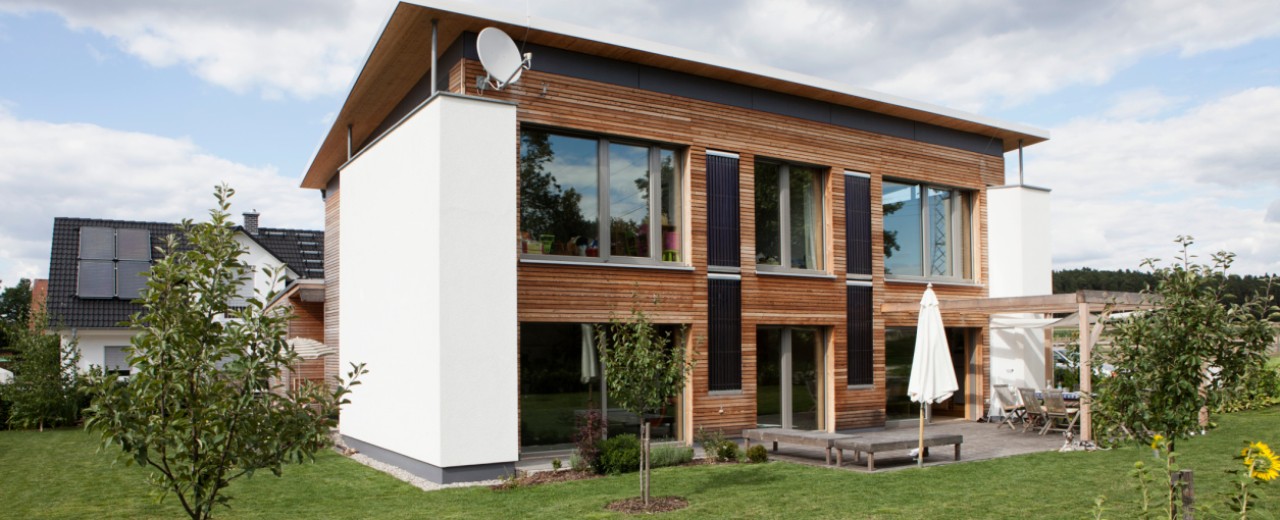
KfW Research
Energy-efficient BuildingsHeat pumps are a key technology for decarbonising domestic heat. In the past 10 years, sales of heat pumps have grown considerably in Germany and Europe. There are regional differences and heat pumps already have a very high market share particularly in northern Europe. This study examines the factors in play and analyses the influence of the relative electricity price on the diffusion of heat pumps. The empirical findings suggest that the electricity-to-gas price ratio is a relevant lever for strengthening the diffusion of heat pumps in Germany and Europe. Survey data from the KfW Energy Transition Barometer support this result, as households themselves also mention cost-effectiveness as a major factor for their use. This opens up options – particularly for a country like Germany, which also manufactures heat pumps.
Heat pumps are gaining ground in Europe – electricity prices matter(PDF, 3 MB, accessible)
Further information on Germany's pursuit of climate neutrality
The energy transition is making progress: around 13 million households in Germany now use at least one energy transition technology – e.g. an electric car, a photovoltaic system or a heat pump. That is over 1 million more households than the previous year. A further 6% of households are planning to purchase one of the technologies in the next 12 months. This is especially pleasing as approval of the energy transition has fallen in the current survey. Around 82% of households stated that they consider the energy transition to be very important or important – compared to 88% a year earlier. This indicates a certain degree of uncertainty among the population. The KfW Energy Transition Barometer, which is representative of households, continues to show that the focus lies on the economic viability of technologies. In fact, scientific life cycle assessments are now often more positive than those of many households.
KfW Energy Transition Barometer 2024(PDF, 881 KB, accessible)
Focus on Economis
This study describes the regional diffusion of household photovoltaic systems in Germany. By the end of 2023, one in eight residential buildings was equipped with such a rooftop solar system. Germany needs to continue accelerating the increase in installed capacity to meet the climate targets. This is important because, among other things, household photovoltaics (PV) generate electricity on site and households can consume it right away, easing the load on the power grid. However, not all regions are equally suitable for PV.
Global radiation determines how much electricity a PV system can generate. Considering the regional global radiation, the following regions currently hold great potential for household PV: Bremen, Hamburg, the Saarland, Mecklenburg-Western Pomerania, the region around Dresden, Schleswig-Holstein, the regions around Lüneburg and Trier, parts of Upper Bavaria, Thuringia and southern Hessen.
Information offerings and advertising campaigns by suppliers of PV can be particularly promising to speed up diffusion in these regions.
The potential for household photovoltaics in Germany(PDF, 3 MB, accessible)
Further analyses on the topic of climate neutrality
Reducing energy consumption and using zero-emission technologies are key to achieving both climate neutrality and energy supply security. Households also need to play a role in this. The findings of the representative KfW Energy Transition Barometer 2023 are therefore encouraging as they demonstrate that households continue to back the energy transition project. Just under one third (32%) of all households are currently using technologies such as photovoltaic systems or heat pumps, 3 percentage points or 1.2 million households more than in the previous year. A further 7% plan to acquire such technologies this year. This increase is evident across almost all groups of society. The majority of households that do not use energy transition technologies (60%) can now imagine using them. In order to further advance the energy transition, it is now necessary to eliminate financial and logistical barriers to modernisation in a targeted manner.
KfW Energy Transition Barometer 2023(PDF, 961 KB, accessible)
Further information of the KfW Energy Transition Barometer
The current gas crisis and the increasingly visible impact of climate change both underscore the need for a more sustainable energy supply. The KfW Energy Transition Barometer 2022 shows that around 90% of households in Germany believe the energy transition is important. At the same time, many have serious doubts as to whether it can be achieved with a fair distribution of burdens between all groups of society. These reservations negatively impact on households' willingness to take action. Nonetheless, around 29% of households are already using energy transition technologies, while a further 13% plan to do so sometime this year. Existing buildings hold particular potential for reducing the consumption of fossil fuels. As lower-income households are most likely to reside in poorly insulated buildings with high potential for savings, financial barriers to modernisation and relevant information deficits must be eliminated here in particular.
KfW Energy Transition Barometer 2022(PDF, 648 KB, non-accessible)
Economics in Brief
Greenhouse gas emissions in the building sector have already dropped by more than 40% since 1990. But under the Climate Protection Act, today’s emissions must fall by another 43% by 2030. That will not just require a sharper increase than in the energy, manufacturing and transport sectors. It also means that the annual reduction rates have to more than double again. The sector therefore continues to face major challenges and must focus even more strongly on the existing building stock and non-residential buildings. In addition to targeted support, a rising CO2 price in particular can help make greenhouse gas emission reduction measures more economically attractive.
Climate neutrality: Energy efficiency of buildings remains crucial!(PDF, 102 KB, non-accessible)
Economics in Brief
Burglaries have been declining for some years but only one quarter of existing dwellings in Germany are sufficiently protected against break-ins. Break-ins not only cause financial losses but also psychological damage. A recent evaluation has shown that some 55,000 existing dwellings are effectively protected against break-ins each year under KfW’s ‘Burglary Protection’ programme. The coronavirus crisis is expected to increase demand for structural burglary protection but income losses will make investments more difficult at the same time.
Publications from previous years can be found in our Download Centre or by using our Search.



Share page
To share the content of this page with your network, click on one of the icons below.
Note on data protection: When you share content, your personal data is transferred to the selected network.
Data protection
Alternatively, you can also copy the short link: https://www.kfw.de/s/enkBbrjf
Copy link Link copied